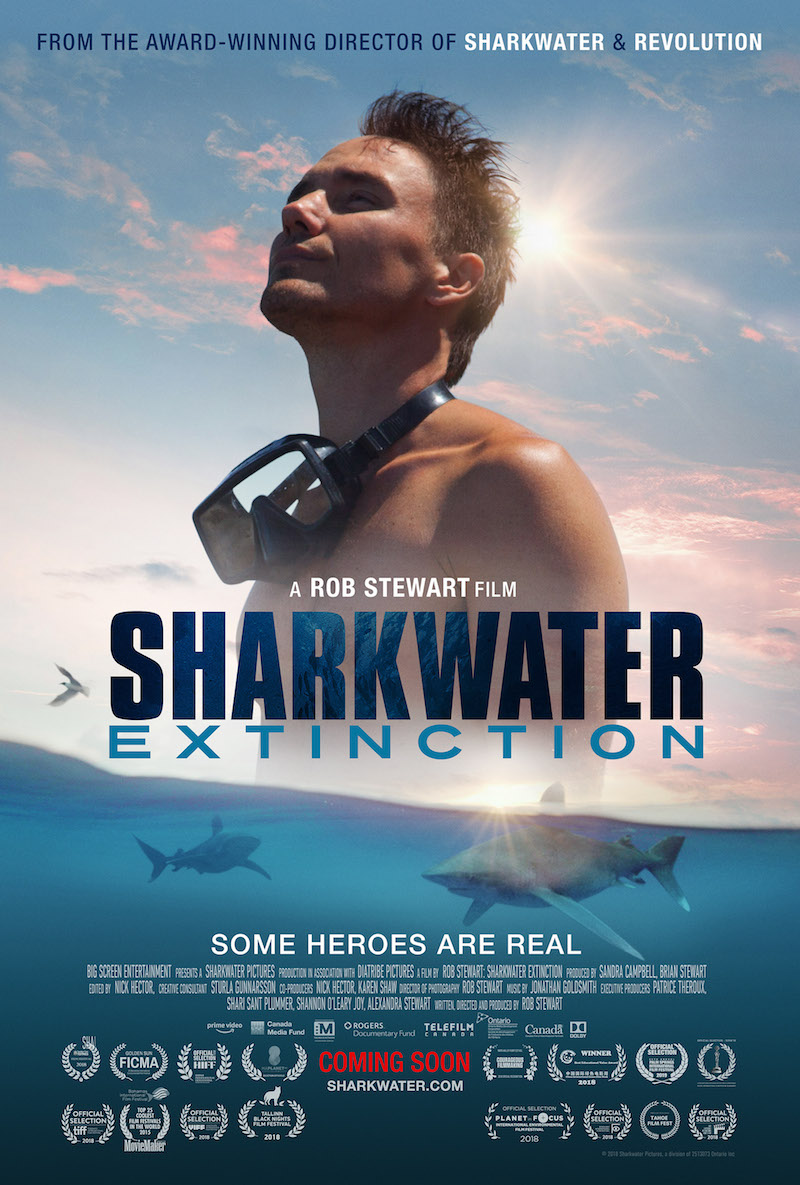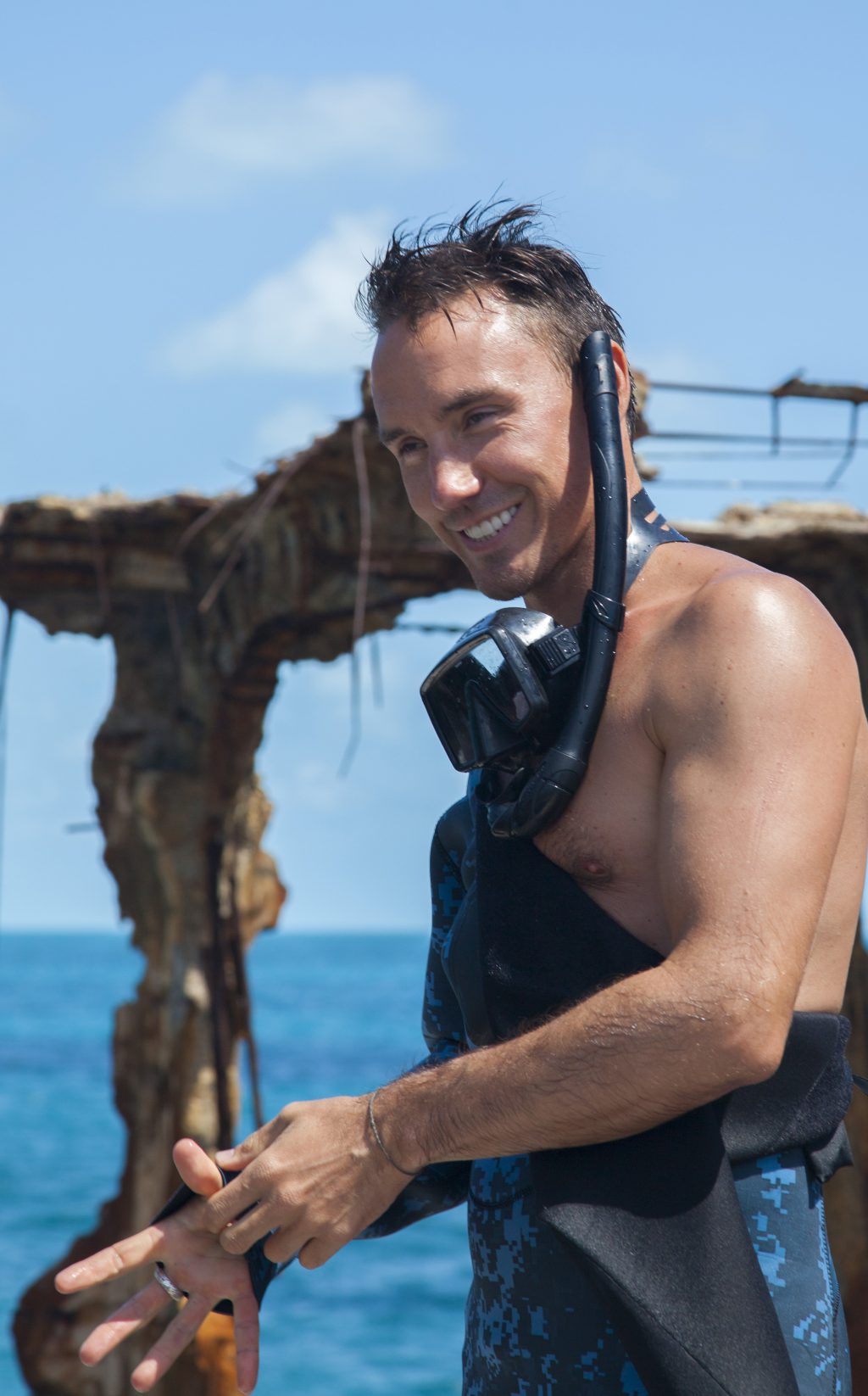SLO Film Fest: Wolves, Sharks, and that "Delicate Balance"
 Saturday, March 16, 2019 at 11:58PM
Saturday, March 16, 2019 at 11:58PM Nathaniel R reporting from the San Luis Obispo International Film Festival


After a delightful trip back to 1969 iconography and disturbing peek back at 1933 fascism, the San Luis Obispo's 25th festival threw us directly into the immediate now with three engaging documentaries exploring very real, very urgent problems with our ecosystems, relationships with animal life, and the dehumanizing dangers of globalism and late stage capitalism. That may sound depressing, and it was to an extent, but all three films were suffused with enough passion and optimism to make their bitter pills easier to swallow.
The shortest and "lightest" of these with Collin Monda's hour-long documentary The Trouble With Wolves, which is locked but not quite finished (needing funds to complete its rights clearances and such). It's a surprisingly nuanced look at the success and aftershocks of a 1995 federal program to reintroduce gray wolves to the US via Yellowstone National Park. The program was a huge success, the wolves rapidly multiplying, but not everyone was happy with the results or that the animals weren't delisted from a protected species list they were put on when they were virtually extinct (within the US at least). Ranchers neighboring Yellowstone were adversely affected. The effects to the ecosystem when you introduce or remove a predator are far-reaching and in ways we had never even considered. Despite its brief length Wolves covers a lot of ground -- and that ground is quite literally mapped out and illustrated at times (a very smart filmmaking decision) to remind you of proximities and borders and migrations and the like. Monda, a first time feature director who has been obsessed with wolves since having a wolf-dog hybrid as a kid, is either very gifted with interviewing or was blessed with tremendous luck on his very short shoot. All seven of the camera subjects, while not as photogenic as the wolves themselves (joke!), from ranchers to park rangers to wolf experts, presented their cases very well. Even the rancher we least liked, given his desire to kill all the wolves, gets a spontaneous and humanizing punchline of sorts when his granddaughter wanders into frame clutching a stuffed animal ("wolfy") that she adores. The look on his face is priceless, reminding us that he is aware that he's long since lost the public relations war over the animals..
I had to promise not to shoot that one."
If you've seen the documentary Sharkwater (2006), which was a theatrical success in 2007, you should know it has a sequel! The original doc increased awareness of the monstrous practice of "finning" in which sharks are pulled form the water, their fins are caught off, and the animals are tossed back in (and quickly die without being able to swim. All to make the delicacy known as shark fin soup. The footage of this act (thankfully shown but once and very briefly) is one of the most shockingly evil things we've ever witnessed onscreen.
 Rob Stewart
Rob Stewart
Rob Stewart's documentary obviously shocked people back then and increased worldwide pressure to ban the practice. Many countries have since passed legislation to do so. Unfortunately loopholes exist and those loopholes have been exploited by unsavory players (including organized crime), huge fisheries and small fisherman alike... all in the name of human greed. If you care about animal rights or love amazing underwater footage (guilty on both counts!) Sharkwater Extinction is a must-see.
With such an upsetting subject matter -- seriously what are we doing to this world? Every year mankind seems even more destructive -- it helps a lot that both the sharks themselves and Rob Stewart are as photogenic as movie stars. Sadly this is the last film from Rob Stewart. The award winning filmmaker and activist died in 2017 during the shooting of this very movie. The final image of Stewart as he preps for another dive, like he would for any other (I wish the documentary's soundtrack hadn't put in such funereal music here to cue the end) is terribly sad but he died doing what he loved and he fought for all of his 37 years to save these crucial animals in the world's oceans.
The best of the three documentaries we screened was by Spanish filmmaker Guillermo García López. His Goya winning documentary Fragil Equilibrio or Delicate Balance, available on some VOD platforms, is a beautiful engaging meditation. We worried going in from the program description that we would be treated to some Babellike heavyhanded profoundity about interconnectedness. But this was a far more sober but still emotionally evocative film.
The film follows people in Japan, Spain, and Africa trying to navigate lives of poverty, whether that's spiritual or physical. In Japan we meet business men who have good incomes but no emotional lives. They're terrified to quit their jobs but admit that they're miserable. There's even startling but not gratuitous surveillance footage of a public suicide in a commuter station. In Africa we're near Morocco where refugees are trying to scale a fence to make it to an immigration center where they'll be safe and able to earn livings for their families at homes. In Spain we're dealing with long term unemployment and homelessness. The film's central ideas about globalization and a need for the human race to reverse course -- we're currently serving only economic interests with little to no concern for human life and happiness -- are loosely gathered around an awesome interview with former president of Uruguay, Jose “Pepe” Mujica. Though Delicate Balance is sometimes depressing to watch -- and it's frustrating that there are no female subjects -- but we highly recommend it.

The film thankfully ends on a note of hope and optimism but I couldn't help but think of that scene from 20th Century Women when Dorothea's friends watch a moving State of the Union address from President Jimmy Carter and there are two simultaneous reactions in the room, one realist, the other spiritual:
- He's toast.
- I thought that was beautiful.
 Goyas,
Goyas,  Guillermo García López,
Guillermo García López,  SLO,
SLO,  documentaries,
documentaries,  film festivals,
film festivals,  politics,
politics,  zoology
zoology 


Reader Comments